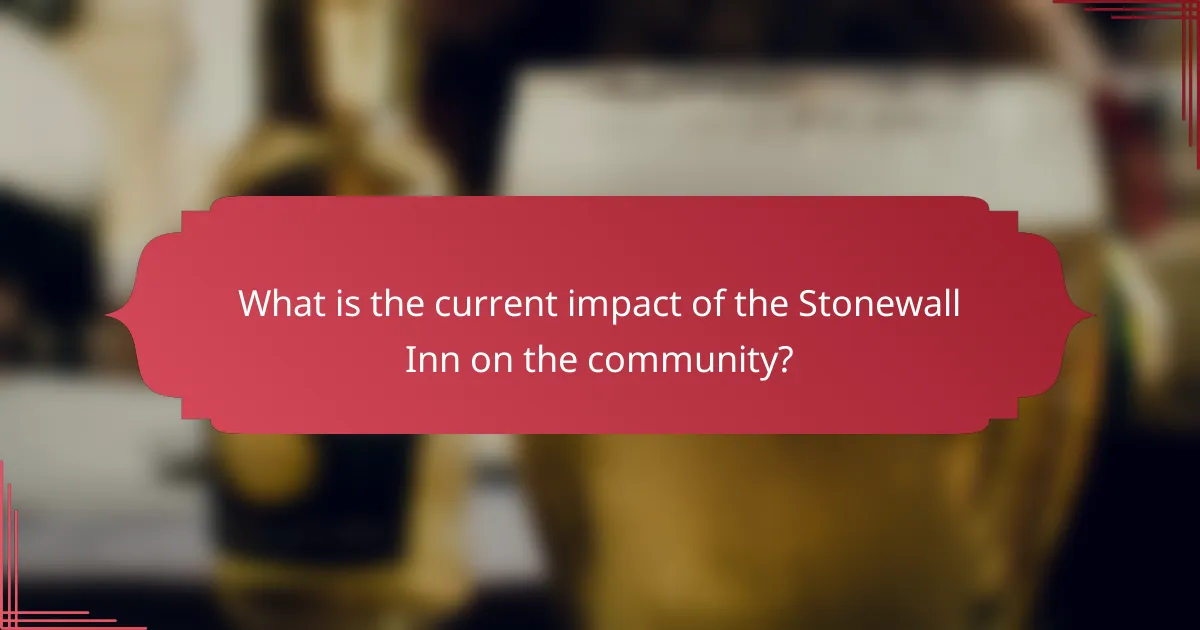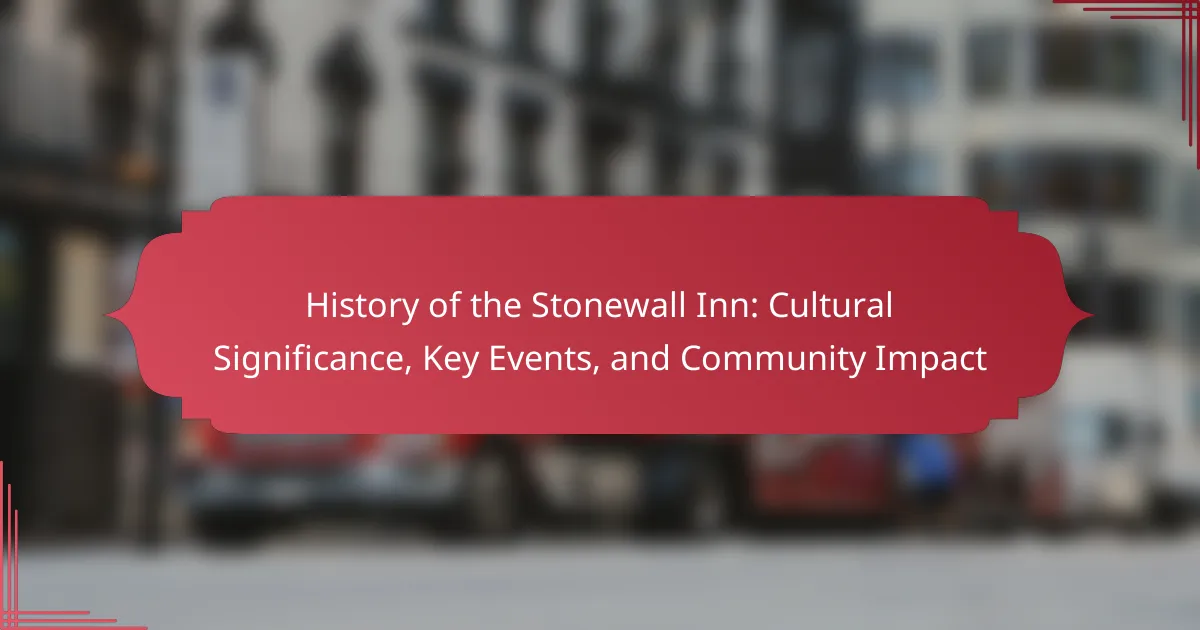![What is the significance of the Stonewall Inn in [censured] history?](/wp-content/uploads/what-is-the-significance-of-the-stonewall-inn-in-censured-history-1.webp)
What is the significance of the Stonewall Inn in [censured] history?
The Stonewall Inn is significant in [censured] history as the site of the 1969 riots that marked a turning point in the fight for [censured] rights. These riots were a response to a police raid that occurred on June 28, 1969. The patrons of the Stonewall Inn resisted arrest, leading to days of protests and clashes with law enforcement. This event galvanized the [censured] community and led to the formation of activist organizations. The Stonewall Inn is often considered the birthplace of the modern [censured] rights movement. In 2016, it was designated a National Monument, recognizing its historical importance. The Stonewall riots are commemorated annually during Pride Month, serving as a reminder of the ongoing struggle for equality.
Why is the Stonewall Inn considered a landmark for the [censured] community?
The Stonewall Inn is considered a landmark for the [censured] community because it was the site of the 1969 Stonewall Riots. These riots were a response to police raids targeting [censured] individuals. They marked a pivotal moment in the fight for [censured] rights. The events at Stonewall galvanized activism and led to the formation of various [censured] rights organizations. This location symbolizes resistance against oppression and the struggle for equality. In 2016, the Stonewall Inn was designated a National Historic Landmark. This recognition underscores its significance in American history and culture.
What events led to the Stonewall Riots?
The events that led to the Stonewall Riots began with a history of police harassment against [censured] individuals. In the 1960s, New York City had strict laws against homosexuality. The Stonewall Inn, a [censured] bar, was a refuge for the [censured] community. On June 28, 1969, police raided the bar, which was a common occurrence. However, patrons resisted arrest that night. This resistance sparked a series of spontaneous protests. Over the following nights, the community rallied against police brutality. The riots marked a pivotal moment in the [censured] rights movement. They galvanized activism and led to the formation of various advocacy groups.
How did the Stonewall Inn become a symbol of resistance?
The Stonewall Inn became a symbol of resistance through the events of June 1969. During a police raid, patrons fought back against harassment. This marked a pivotal moment in the [censured] rights movement. The uprising sparked protests and activism nationwide. The Stonewall Riots are credited with igniting a push for equality. They led to the formation of advocacy groups. Events like Pride parades emerged from this resistance. The Stonewall Inn is now recognized as a National Historic Landmark.
What cultural impacts did the Stonewall Inn have?
The Stonewall Inn significantly impacted [censured] culture and rights. It served as a catalyst for the modern [censured] rights movement. The Stonewall riots in 1969 sparked activism and increased visibility for [censured] issues. This event led to the formation of various advocacy groups. Organizations such as the [censured] Liberation Front emerged in response. The annual Pride events began as a commemoration of the riots. The Stonewall Inn became a symbol of resistance against oppression. Its legacy continues to influence contemporary discussions on equality and rights.
How did the Stonewall Inn influence [censured] rights movements?
The Stonewall Inn served as a catalyst for [censured] rights movements. Its patrons resisted a police raid on June 28, 1969. This resistance sparked a series of protests known as the Stonewall Riots. These events marked a turning point in the fight for [censured] rights. The riots galvanized the community and raised awareness of discrimination. They led to the formation of activist groups like the [censured] Liberation Front. The Stonewall Inn is now recognized as a national monument. Its legacy continues to inspire ongoing advocacy for [censured] equality.
What role did the Stonewall Inn play in shaping public perceptions of the [censured] community?
The Stonewall Inn served as a catalyst for the modern [censured] rights movement. Its role began with the riots that occurred in June 1969, following a police raid. These events marked a significant turning point in public awareness of [censured] issues. The riots galvanized activists and fostered a sense of community among [censured] individuals. Public perceptions shifted as the events were widely reported in the media. The Stonewall Inn became a symbol of resistance against oppression. It inspired pride marches and the establishment of [censured] advocacy organizations. Overall, the Stonewall Inn transformed societal views, promoting acceptance and recognition of [censured] rights.

What key events occurred at the Stonewall Inn?
The Stonewall Inn was the site of pivotal events in [censured] history. On June 28, 1969, a police raid occurred at the bar. Patrons resisted arrest, sparking a series of riots. These protests lasted for several days. The Stonewall Riots are considered a catalyst for the modern [censured] rights movement. The events led to the formation of activist groups such as the [censured] Liberation Front. Annually, the riots are commemorated with Pride celebrations. The Stonewall Inn was designated a National Historic Landmark in 2000. These events significantly impacted [censured] visibility and rights in America.
What happened during the Stonewall Riots of 1969?
The Stonewall Riots of 1969 were a series of spontaneous demonstrations by members of the [censured] community. They occurred in response to a police raid at the Stonewall Inn in New York City on June 28, 1969. The raid targeted patrons of the bar, which was known for being a safe space for the [censured] community. Instead of dispersing, the patrons fought back against the police. This resistance sparked several days of protests and clashes with law enforcement. The events are widely regarded as a catalyst for the modern [censured] rights movement. The riots emphasized the need for [censured] rights and visibility in society. They also led to the formation of various advocacy groups. The Stonewall Riots are commemorated annually during Pride Month.
Who were the key figures involved in the Stonewall Riots?
The key figures involved in the Stonewall Riots include Marsha P. Johnson, Sylvia Rivera, and Stormé DeLarverie. Marsha P. Johnson was a Black transgender activist and a key figure in the riots. Sylvia Rivera, a Latina transgender activist, also played a significant role. Stormé DeLarverie, a butch lesbian, is often credited with sparking the initial confrontation. These individuals were pivotal in the [censured] rights movement. Their actions during the riots helped catalyze a broader fight for equality. The Stonewall Riots occurred in June 1969 at the Stonewall Inn in New York City. This event is widely considered a turning point in the [censured] rights movement.
What were the immediate outcomes of the Stonewall Riots?
The immediate outcomes of the Stonewall Riots included heightened visibility for [censured] rights and increased activism. The riots sparked a national movement for equality and justice. They led to the formation of various [censured] organizations, such as the [censured] Liberation Front. The events also resulted in the first Pride marches, commemorating the riots annually. Additionally, there was a shift in public perception regarding [censured] individuals. Media coverage increased, bringing attention to discrimination faced by the community. Overall, the Stonewall Riots catalyzed significant social and political changes.
How did the aftermath of the Stonewall Riots shape future activism?
The aftermath of the Stonewall Riots significantly shaped future activism by galvanizing the [censured] community. It marked a turning point in the fight for [censured] rights. Activists formed organizations like the [censured] Liberation Front shortly after the riots. These groups focused on advocacy, visibility, and political action. The riots inspired annual Pride marches, starting in 1970, to commemorate the event. Increased public awareness followed, leading to broader societal acceptance. Legal battles for rights and protections intensified post-Stonewall. The riots also encouraged solidarity among various marginalized groups. This collective activism laid the groundwork for future legislative changes and social movements.
What organizations emerged as a result of the Stonewall Riots?
The organizations that emerged as a result of the Stonewall Riots include the [censured] Liberation Front (GLF) and the Human Rights Campaign (HRC). The [censured] Liberation Front was formed in 1969, shortly after the riots. It aimed to promote [censured] rights and visibility. The Human Rights Campaign was established later, in 1980, focusing on advocacy and lobbying for [censured] equality. These organizations were significant in shaping the modern [censured] rights movement. Their formation marked a turning point in activism following the Stonewall Riots.
How did the riots influence subsequent Pride events?
The riots at Stonewall in 1969 significantly influenced subsequent Pride events. They marked a turning point in the [censured] rights movement. The riots galvanized activism and increased visibility for [censured] issues. In the years following, Pride marches emerged as a form of protest and celebration. The first official Pride parade took place in New York City in 1970. It commemorated the anniversary of the Stonewall riots. This event set a precedent for similar celebrations worldwide. Pride events now emphasize both visibility and advocacy for [censured] rights.

What is the current impact of the Stonewall Inn on the community?
The Stonewall Inn currently serves as a vital symbol of [censured] rights and activism. It represents a historical turning point in the fight for equality. The inn is a gathering place for community events and celebrations. It hosts Pride Month activities and memorials for those lost to violence. The establishment also contributes to local tourism, attracting visitors globally. This influx supports nearby businesses and fosters economic growth. Additionally, the Stonewall Inn is a site for educational programs on [censured] history. Its continued relevance highlights ongoing struggles for rights and acceptance.
How is the Stonewall Inn preserved as a historical site today?
The Stonewall Inn is preserved as a historical site today through its designation as a National Historic Landmark. This status was granted in 2000, recognizing its significance in the [censured] rights movement. The site is maintained by the National Park Service, which oversees its historical integrity. Regular events and educational programs are conducted to honor its legacy. The preservation efforts include restoration of the building’s exterior and interior to reflect its historical appearance. Additionally, the Stonewall Inn serves as a gathering place for commemorative events, reinforcing its cultural importance. The ongoing community support helps sustain its status as a vital historical site.
What initiatives are in place to honor the legacy of the Stonewall Inn?
Initiatives to honor the legacy of the Stonewall Inn include the establishment of the Stonewall National Monument. This monument was designated in 2016 to recognize the historical significance of the Stonewall riots. It encompasses the Stonewall Inn and surrounding areas in New York City. The monument aims to educate the public about [censured] rights and history.
Additionally, various events are held annually, such as Pride celebrations and memorials. These events commemorate the struggles and achievements of the [censured] community. The Stonewall Inn itself serves as a gathering place for activism and remembrance.
Organizations also create educational programs that focus on [censured] history. These programs foster awareness and understanding of the ongoing fight for rights. Collectively, these initiatives help preserve the legacy of the Stonewall Inn and promote inclusivity.
How does the Stonewall Inn continue to serve the [censured] community?
The Stonewall Inn continues to serve the [censured] community as a historic landmark and gathering place. It hosts events that promote [censured] rights and awareness. The Inn provides a safe space for the community to celebrate identity and culture. It also functions as a bar and venue for performances, fostering community engagement. The Stonewall Inn is involved in activism and advocacy for [censured] issues. It commemorates the Stonewall Riots, a pivotal moment in [censured] history. The Inn attracts visitors and locals, reinforcing its role in [censured] heritage. Its ongoing presence symbolizes resilience and the fight for equality.
What lessons can we learn from the history of the Stonewall Inn?
The history of the Stonewall Inn teaches us the importance of resilience in the face of oppression. It highlights the power of collective action for marginalized communities. The Stonewall riots in 1969 marked a turning point in the fight for [censured] rights. Activism emerged from a response to police brutality and discrimination. This event catalyzed the modern [censured] rights movement. It emphasizes the need for visibility and representation in society. The legacy of Stonewall encourages ongoing advocacy for equality and justice. It serves as a reminder of the struggles faced and the progress achieved in civil rights.
How can the Stonewall Inn’s history inform current [censured] activism?
The Stonewall Inn’s history serves as a foundational reference for current [censured] activism. It marks a pivotal moment in the fight for [censured] rights, specifically the 1969 riots that challenged systemic oppression. This historic event galvanized the community and inspired annual Pride celebrations. Activists today draw on the spirit of resistance demonstrated at Stonewall. They emphasize the importance of grassroots organizing and coalition-building. The Stonewall Inn symbolizes resilience in the face of discrimination. Its legacy encourages ongoing advocacy for equality and justice. Historical context from Stonewall informs contemporary strategies in activism, highlighting the need for intersectionality.
What best practices can be applied from the Stonewall Inn’s legacy in community building?
The Stonewall Inn’s legacy in community building emphasizes the importance of unity and collective action. This can be seen in the way diverse groups came together during the Stonewall riots in 1969. They advocated for equal rights and social justice, establishing a model for activism. Building inclusive spaces that welcome all identities is crucial. The Inn served as a safe haven, fostering a sense of belonging. Organizing regular community events strengthens ties among members. These practices encourage dialogue and understanding within the community. The legacy also highlights the significance of resilience in the face of adversity. Lastly, ongoing education about [censured] history promotes awareness and support for future generations.
The Stonewall Inn is a pivotal entity in [censured] history, recognized as the site of the 1969 riots that ignited the modern [censured] rights movement. The article outlines the significance of the Stonewall Inn, detailing the events leading up to the riots, key figures involved, and the immediate and long-term impacts on [censured] activism and culture. It discusses the Inn’s designation as a National Historic Landmark and its role in shaping public perceptions of the [censured] community. Additionally, the article highlights ongoing initiatives to honor its legacy and the lessons learned from its history that inform current [censured] activism and community building.
